Talk about undercutting on price. A non-profit has developed a cure for Hepatitis C which is just as effective as the current drug available – it will cost patients $300.
What it means: Hep C affects 71 million people worldwide and kills 40,000 people a year. But the high cost of existing drugs means only 3 million people are currently receiving treatment.
The non-profit Drugs for Neglected Diseases initiative (DNDi) has received funding from a number of different organisations to run trials on a new drug. They're working with an Egyptian pharma company to bring a new treatment to countries that can't afford to pay the high price by the leading US-made drugs.
DNDi is tearing up the rule book on what we thought about the way pharmaceuticals are produced. So why are drugs so expensive? On a very basic level, it's because it costs a lot of money to develop and test them (what's called 'Research & Development', or R&D). According to this very good Forbes explainer, it's not unusual for a drug company to spend $500 million on a single clinical trial.
Pharmaceuticals companies are also very protective over what's called 'intellectual property' – if the ideas (and the research costs) are theirs, then no other company can enter the market and compete. That means they can bump up the price – and they'll make sure they're making a profit too.


